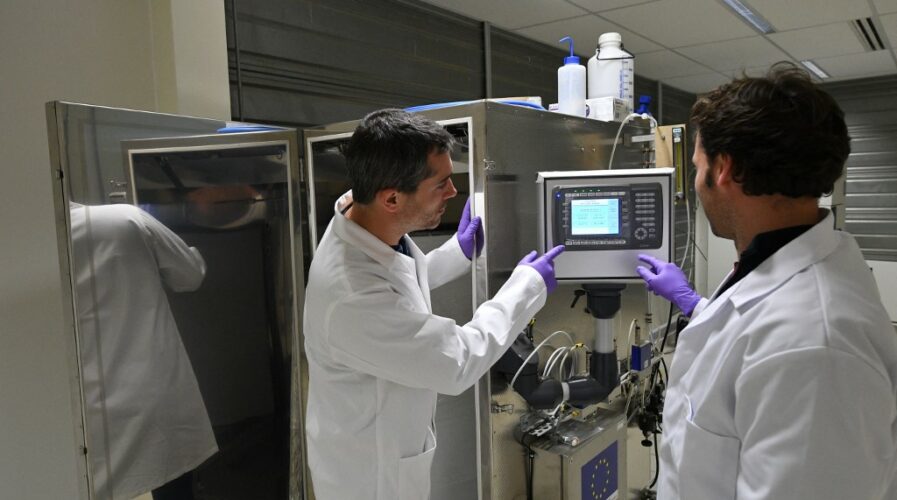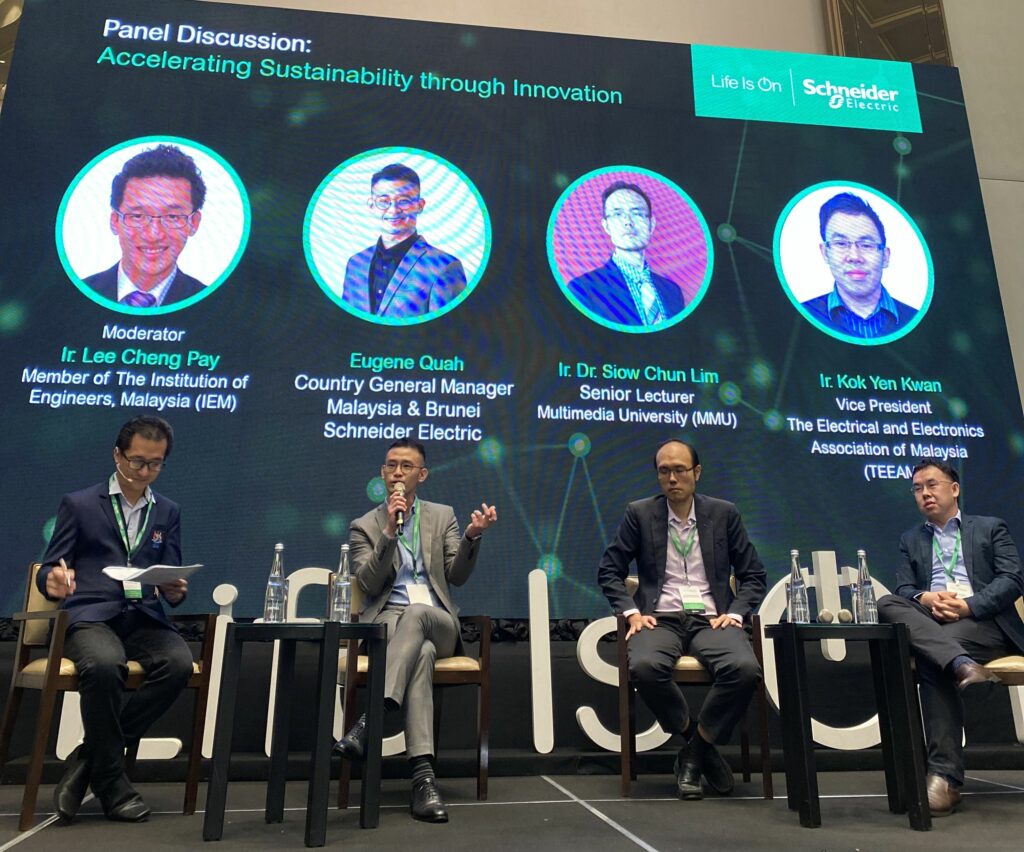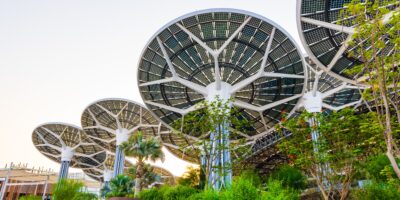
The Lab’in’Tech laboratory in the Atlantech Low Carbon Park, a pilot site in the fields of energy efficiency, eco-building, sustainable development and soft mobility. (Photo by XAVIER LEOTY / AFP)
Can businesses truly foster sustainability with innovation?
Innovation to push the boundaries of environmental sustainability and governance (ESG) initiatives are already out there in the marketplace, it’s now a matter of organizations applying them on a wider scale. Technology can help not only address some of the adverse effects of climate change, but can actually help the organization to detect for green vulnerabilities, and increase agility and efficiency too.
Or at least that was according to the opinion of the panelists at the ‘Accelerating Sustainability through Innovation’ panel last week, organized by Schneider Electric as part of the company’s Innovation Day 2022, to highlight to Malaysian businesses and industrial players how they can power ESG potential with digitization.
Key industry leaders in the country discussed how to achieve better business and environmental sustainability through innovation, as well as their passion for technological trends impacting industry. The Malaysian government took a bold move, according to Engineer Kok Yen Kwan, the vice president of The Electrical and Electronics Association of Malaysia (TEEAM), to commit to a 45% pledge in conserving biodiversity as part of the global Paris Agreement.
“We are proud that Malaysia is one of the seventeen countries that has been identified as a megadiverse country by The World Conservation Monitoring Centre (WCMC) of the United Nations,” commented Kok. “To continue the efforts in conserving biodiversity, we need to find ways to consume energy without jeopardizing the future.”
“So when the Malaysian government commits to higher targets, it’s going to be good news for everyone including Schneider, the engineers, the developers, the owners and the consultancy. So it’s how we make use of this. The advancements over these past five to 10 years have seen innovation in sustainability go through a lot of changes. I’m sure every one of you has heard of GPI [genuine progress indicator, a metric used to gauge the economic growth of a country] and that the developers and the owners are building tons of green buildings now, and those are certified silver or platinum” showing the evolution of compliance standards for tracking ESG and other economic factors responsibly in Malaysia.
Not just for businesses, Kok also pointed how governments could better support consumer-oriented sustainability innovation, such as electric vehicles, which are projected to earn US$100.2 million in revenue in 2022 and are expected to show an annual growth rate in earnings of 24.09% between now and 2027. “Everybody today is talking about e-vehicles, right? Even in condos, they say they want to build charging stations. But the fight is who is going to pay for the bill. Building the charging station is not a problem. Who pays the bill is the problem.
“So overall, I will say that we are moving forward, we are moving ahead,” Kok summarized. “The sustainability agenda is definitely here. But it’s just how we consolidate the whole, the whole game plan, to make sure it works rather than working in siloed bureaucracy.”
Eugene Quah, Schneider Electric general manager in Malaysia, highlighted how most businesses are after the twin goals of decarbonization and more efficient energy use – which is where digitalization can play a key role. “80% of carbon emissions come from energy use, and we have to be facing more and more because of urbanization, industrialization. So to reduce energy consumption, and to use it more efficiently, how are we going to do that?”
“The climate crisis we face today is the result of the decisions we make together – business, government, consumers,” he said, using traffic and navigation app Waze as an example of optimizing travel time via digital data input. The same can be done for optimizing energy efficiency in oganizations, tapping industrial innovations like IoT (internet of things), intelligent automation, and data insights to further sustainability aims.
“How can it help us to make decisions faster, smarter, and more precise? We find that with the data we have, if you’re able to measure it, you can do it much better,” Quah added.

From left: panel moderator & Member of The Institution of Engineers, Malaysia (IEM) Alex Looi, Schneider Electric Malaysia Country General Manager Eugene Quah, MMU lecturer Ir. Dr. Siow Chun Lim, and TEEAM vp Ir. Kok Yen Kwan
Meanwhile, Engineer Dr Siow Chun Lim, a senior lecturer at the Multimedia University (MMU), mentioned that with carbon neutrality by 2050 the target for many countries according to the COP26 summit in February, sustainability and innovation should go hand in hand to accelerate the pace of development towards reaching those targets.
In this case, “educators need to get out of their comfort zone and mingle with the industry to gain practical insights and reinvent the syllabus” for engineering faculties to be more environmentally aware from the grassroots, especially for students in their third year and final years of study. “To make our sustainability vision a reality, Malaysia needs to have a strong talent pool. The students of today are the industry leaders of tomorrow and they need to be future-ready,” the lecturer went on. “In order to achieve that, we need to ensure that university students are exposed to sufficient real-world experiences, gained through industry training programs.”
As a leading player in digitally transforming energy management and automation globally, Schneider Electric is playing a pivotal role in supporting the ambitious sustainable transformation journey of businesses in Malaysia. “At Schneider Electric, we have three key enablers that allow us to help businesses meet new sustainability demands. These key enablers include ensuring the transparency of consumption data, incorporating analytics and Artificial Intelligence, as well as introducing collaborations in the digital ecosystem.,” elaborated Schneider’s Quah.
He added that “with all these enablers in place, businesses will then be empowered to efficiently measure and optimize their energy consumption, and as a result, play a vital role in shaping Malaysia’s sustainable future.”
READ MORE
- Strategies for Democratizing GenAI
- The criticality of endpoint management in cybersecurity and operations
- Ethical AI: The renewed importance of safeguarding data and customer privacy in Generative AI applications
- How Japan balances AI-driven opportunities with cybersecurity needs
- Deploying SASE: Benchmarking your approach


